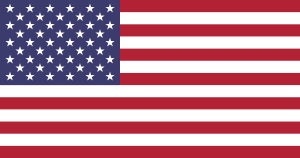Americans

|
|
| Total population | |
|---|---|
|
c. 308 million 2010 United States Census c. 320 million 2015 estimate |
|
| Regions with significant populations | |
| Mexico | 738,100–1,000,000 |
| Canada | 316,350–1,000,000 |
| Germany | 324,000 |
| Philippines | 220,000–600,000 |
| Israel | 200,000 |
| United Kingdom | 139,000–197,143 |
| Costa Rica | 130,000 |
| South Korea | 120,000–158,000 |
| France | 100,000 |
| China | 71,493 |
| Brazil | 70,000 |
| Colombia | 60,000 |
| Hong Kong | 60,000 |
| India | 60,000 |
| Australia | 56,276 |
| Japan | 51,321 |
| Italy | 50,000 |
| United Arab Emirates | 50,000 |
| Haiti | 45,000 |
| Saudi Arabia | 40,000 |
| Argentina | 37,000 |
| Norway | 33,509 |
| Bahamas | 30,000 |
| Lebanon | 25,000 |
| Panama | 25,000 |
| El Salvador | 19,000 |
| New Zealand | 17,751 |
| Honduras | 15,000 |
| Chile | 12,000 |
| Taiwan | 10,645 |
| Austria | 10,175 |
| Bermuda | 8,000 |
| Kuwait | 8,000 |
| Languages | |
| Primarily English, but also Spanish and others | |
| Religion | |
| Primarily Christian (Protestantism, Catholicism, and Mormonism) Various non-Christian religions (Judaism and others) |
|
Americans are citizens of the United States of America. The country is home to people of many different national origins. As a result, Americans do not equate their nationality with ethnicity, but with citizenship and allegiance. Although citizens make up the majority of Americans, non-citizen residents, dual citizens, and expatriates may also claim an American identity.
The use in English of the term "American" to exclusively mean people of the United States developed from its original use to differentiate English people of the American colonies from English people of England despite its linguistic ambiguity in other senses of the word "American", which can also refer to people from the Americas in general. See Names for United States citizens.
The majority of Americans or their ancestors immigrated to America or were brought as slaves within the past five centuries, with the exception of the Native American population and people from Hawaii, Puerto Rico, Guam, and the Philippine Islands who became American through expansion of the country in the 19th century, and American Samoa, the U.S. Virgin Islands and Northern Mariana Islands in the 20th century.
Despite its multi-ethnic composition, the culture of the United States held in common by most Americans can also be referred to as mainstream American culture, a Western culture largely derived from the traditions of Northern and Western European colonists, settlers, and immigrants. It also includes influences of African-American culture. Westward expansion integrated the Creoles and Cajuns of Louisiana and the Hispanos of the Southwest and brought close contact with the culture of Mexico. Large-scale immigration in the late 19th and early 20th centuries from Southern and Eastern Europe introduced a variety of elements. Immigration from Asia, Africa, and Latin America has also had impact. A cultural melting pot, or pluralistic salad bowl, describes the way in which generations of Americans have celebrated and exchanged distinctive cultural characteristics.
...
Wikipedia
